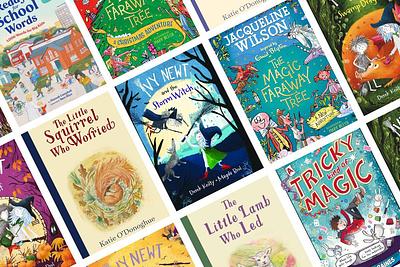Growing with picture books
Picture books offer an entry point into the world of literacy for babies – even before they are born – as well as throughout their early years of development. There is a solid evidence base that demonstrates how valuable it is to read to babies, including the opportunities it provides for them to see and hear the language that will become the currency they use to communicate with others throughout life.
In Bookbug Sessions, leaders introduce songs, rhymes and stories accompanied by actions so that children are learning what words mean as they join in with the activities and recitation or singing. Words, sounds and phrases are often repeated so that children hear them again and again and learn to pronounce and comprehend those sounds, words and phrases. Gradually they build their vocabulary bank and discover books to be a source of story, information and fun. While picture books can be enjoyed throughout life by people of all ages, as children learn to read for themselves it is important to provide motivating and interesting texts that will encourage them to want to read for themselves. Texts that still include illustrations can be really helpful at this time of transition as it can be overwhelming for a child to be faced with a page of solid print with no explanatory images in the early stages of personal reading.
At Scottish Book Trust we talk about the importance and benefits of reading for pleasure. This involves children selecting books for themselves – finding titles, front covers, themes, genres which appeal to them. All reading is good reading and books can be used not only to develop literacy and communication skills but also to improve support health and mental wellbeing. Reading for pleasure can also help build empathy, improve relationships, develop critical thinking skills and boost creativity while also opening the door to other cultures and perspectives and, interestingly, can provide a means of tackling poverty, too.
The benefits of books with short chapters
Books with short chapters offer an ideal entry point for early readers and many authors now use short chapters as a means of keeping readers hooked on reading. We read a chapter, but it ends on a note which stimulates multiple questions – for example, what is a character planning? What might happen next? What will happen if the protagonist’s plans are discovered? And so, we are motivated to read on! Other short chapter children’s books offer a complete story in each chapter and for some children that too is deeply satisfying.
When children are moving from early, decodable texts, designed to make it possible for them to practise and hone their ability to blend sounds to read and comprehend words and sentences, we have a real opportunity to help them find the books which will excite and delight them. So, whether a child is interested in transport, in superheroes, in comics, in stories or in non-fiction – we can support them in finding the short chapter books which can make shared reading fun too. If a parent or carer reads one paragraph and the child reads the next, they can take turns devouring a short chapter together and continue to enjoy reading and talking about the content as they journey through the book. Once a child is excited about reading, short chapter books can be instrumental in keeping them reading if the content is matched to what interests them.
For older readers too, short chapters can make it possible to continue reading even when time is tight. A short chapter can be enjoyed while having a short coffee break or while waiting for a bus and a story can help pass waiting time in a pleasurable way with a journey into another world.
A few of our favourites
- If you’re not sure where to start with books with short chapters, we recommend Katie O’Donoghue’s series, which look at anxiety, persevering when things are difficult and building courage. Katie is a child and young people’s therapist, and her books are informed, encouraging and supportive. Titles include The Little Squirrel Who Worried, The Little Otter Who Tried and The Little Lamb Who Led.
- The Ivy Newt series of books by Derek Keilty and Magda Brol are funny and entertaining. Suitable for boys and girls. These delightful books have illustrations on almost every page and are ideal transition books. Start with Ivy Newt & The Storm Witch and read on from there!
- Jacqueline Wilson has written new stories of The Magic Faraway Tree inspired by the original characters created by Enid Blyton. The Magic Faraway Tree: A New Adventure and The Magic Faraway Tree: A Christmas Adventure. Both are beautifully written, enchanting stories that will take readers to new and exciting lands!
- For children who are drawn to non-fiction books Ready for School Words by Britannica Books is written by Hannah Campbell and illustrated by Sara Rhys. This introduces vocabulary around routines, school, being creative, animals, having fun, visiting the park, going shopping and going to the doctor so individual children or families or schools can dip in and out of this gorgeous book to build language around life’s events and experiences.
- Lastly, A Tricky Kind of Magic by Nigel Baines is ideal for older readers, published by Hodder Children’s Books, and is a delightful, short chapter, graphic novel with themes of love, loss and finding the magic in life when it seems to have disappeared. It incorporates a magic card trick for readers to learn and practise to share with an audience, too. Whatever you read, we hope you enjoy it! If you’ve enjoyed this article, you may like to read the others we’ve written on different forms of reading, including magazines and comics, gamebooks, manga and audiobooks.
